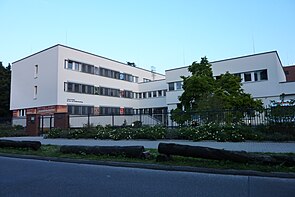Leibniz Institute for Zoo and Wildlife Research
| Leibniz Institute for Zoo and Wildlife Research |
|
|---|---|
 View of the building at Alfred-Kowalke-Straße 17 |
|
| Category: | research Institute |
| Carrier: | Research Association Berlin |
| Legal form of the carrier: | Registered association |
| Seat of the wearer: | Berlin |
| Membership: | Leibniz Association |
| Facility location: | Berlin-Friedrichsfelde |
| Branch office: | Niederfinow |
| Type of research: | Basic research |
| Subjects: | Natural sciences |
| Areas of expertise: | Biology , zoology , ecology |
| Basic funding: | Federal government (50%), states (50%) |
| Management: | Heribert Hofer |
| Employee: | approx. 200 |
| Homepage: | www.izw-berlin.de |
The Leibniz Institute for Zoo and Wildlife Research (IZW) is a research facility supported by the Forschungsverbund Berlin e. V. (FVB) and is a member of the Gottfried Wilhelm Leibniz Scientific Association (WGL). The institute is based in Berlin-Friedrichsfelde , next to the zoo . His research activities are to be assigned to basic research , natural science and the fields of biology , zoology and ecology .
history
The institute emerged from the "Research Center for Vertebrate Research" (FWF) of the former Academy of Sciences of the GDR , founded in 1973 . Based on a recommendation by the Science Council , the institute was re-established on January 1, 1992.
tasks
The IZW is an internationally recognized zoological research institution . She researches the ecology and biology of large populations of wild animals in their natural habitats . The IZW conducts long-term application-oriented basic research in this area, making it the only institution of its kind in Germany that specializes in this area.
Mammals and birds in particular are analyzed by the IZW in their interrelationships with the environment and humans: For this purpose, complex biological and veterinary studies are carried out on wild animals. Mechanisms and functions of evolutionary adaptations that enable the survival and reproduction of wild or human-kept wild animal populations are the focus of the work. Research is also being carried out into the anthropogenic and other influences that endanger the survival of these populations. The scientific work is of international importance, as the knowledge gained is a prerequisite for scientifically based species protection and for concepts of ecological sustainability in the use of natural resources.
Field research stations
The IZW has had a field research station in Niederfinow since 1994 . Deer, hares and mouflons are mainly kept on an area of around 4 hectares. There are several interlinked, near-natural enclosures available for keeping animals, which enable the animals to be caught gently, observation with little disruption and targeted investigations.
Another field research station is in Namibia, 120 km southeast of Windhoek. The station is located in the middle of extensively used farmland. Many native antelope and predator species live on the land, which is mainly used for cattle breeding, including one of the largest populations of the endangered cheetah. In a long-term project, the IZW is investigating the ecology and behavior of cheetahs in order to develop solutions for the cheetah-farmer conflict. Such evidence-based nature conservation with the involvement of the relevant stakeholders is a focus of the IZW philosophy.
Cooperations
A large number of international and multidisciplinary cooperations and protected areas as well as zoos in Europe, Asia, Africa, Australia and North and Mesoamerica exist within the framework of projects .
The IZW works closely with the “Interdisciplinary Center for Infection Biology and Immunity” (ZIBI) at the Humboldt University in Berlin , which was founded in 2005 . This center bundles the activities of the Humboldt University and the non-university institutions in the field of infection biology and immunity .
Another cooperation is operated with the "Department of Veterinary Medicine" (clinic and polyclinic for small pets) of the Free University of Berlin . A joint project on computer tomography in veterinary medicine has existed since 2002 .
The IZW advises various ministries and offices in Germany but also around the world on questions of nature and species protection, biodiversity and wildlife management (e.g. as a member of the Federal Documentation and Advice Center on Wolf (DBBW)).
Infrastructure
The head of the institute is Heribert Hofer. About 200 people work in the institute.
The total budget of the institute is 6.6 million euros, of which around 5.4 million euros were borne half by the federal government and half by the states as part of the basic funding.

